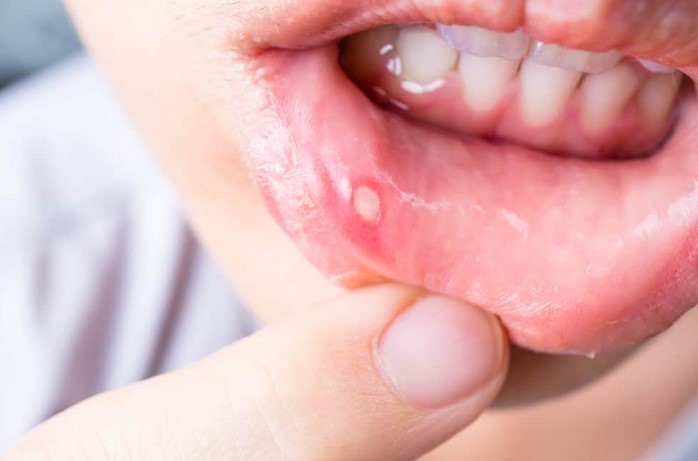
Canker sores, also known as aphthous ulcers, are small, shallow lesions that develop on the soft tissues in your mouth or at the base of your gums. When these sores appear on the roof of the mouth, they can cause discomfort and difficulty while eating, drinking, or speaking. The exact cause of most canker sores is unknown, but they can be triggered by factors such as stress, injury, vitamin deficiencies, or certain foods. Remedies for canker sores range from over-the-counter treatments and prescription medications to home remedies like rinsing with salt water. It’s important to note that while canker sores are painful, they are not contagious and usually heal on their own within one to two weeks.
Understanding Canker Sore on Roof of Mouth: Causes and Remedies
Canker sores, also known as aphthous ulcers, are small, shallow lesions that develop on the soft tissues in your mouth or at the base of your gums. They can be quite painful and can make eating and talking difficult. One of the less common, but particularly uncomfortable locations for these sores to appear is on the roof of the mouth. Understanding the causes and remedies for canker sores on the roof of the mouth can help alleviate the discomfort and speed up the healing process.
The exact cause of canker sores is not entirely understood, but several factors are believed to contribute to their development. These include stress, hormonal fluctuations, food allergies, nutritional deficiencies, particularly of B-12, zinc, folate, or iron, and minor injuries to the mouth from dental work, aggressive brushing, or sports accidents. Certain diseases or conditions, such as celiac disease, inflammatory bowel diseases, Behcet’s disease, and HIV/AIDS, are also associated with an increased incidence of canker sores.
Canker sores on the roof of the mouth can be particularly painful due to the sensitivity of the area and the constant contact with food and drink. The pain usually lessens in a few days, and the sores often heal without treatment in one to two weeks. However, large, persistent, or unusually painful sores often require medical care.
There are several remedies available to manage the discomfort caused by canker sores and to expedite their healing. Over-the-counter topical products, such as creams, ointments, and mouth rinses, can provide temporary relief from the pain. These products often contain benzocaine, a local anesthetic, which numbs the area and reduces discomfort. Prescription treatments, including antimicrobial mouth rinses, corticosteroid ointments, and prescription-strength benzocaine products, are also available for severe cases.
In addition to these treatments, certain lifestyle changes and home remedies can also help manage canker sores. Maintaining good oral hygiene by brushing and flossing regularly can prevent secondary infections and promote healing. Avoiding spicy, acidic, or hard foods that can irritate the sores is also recommended. Instead, opt for soft, bland foods that are easier on the mouth. Drinking plenty of water and staying hydrated can also help keep the mouth moist and reduce discomfort.
Natural remedies, such as rinsing the mouth with a solution of warm water and salt or baking soda, can also provide relief. Some people find that applying a paste of baking soda and water directly to the sore can help reduce inflammation and speed up healing. However, these remedies should be used with caution, as they can cause a burning sensation and may not be suitable for everyone.
In conclusion, canker sores on the roof of the mouth, while uncomfortable, are generally harmless and tend to heal on their own within a week or two. Understanding the potential causes and knowing how to manage the symptoms can help make the healing process more bearable. However, if the sores are large, persistent, or unusually painful, it is important to seek medical attention, as they could be a sign of a more serious underlying condition.Canker sores on the roof of the mouth can be caused by various factors such as stress, hormonal changes, food allergies, vitamin deficiencies, or minor injuries from dental work, aggressive brushing, or accidental bites. They can be quite uncomfortable, but they are not contagious and usually heal on their own within one to two weeks. Remedies to alleviate the discomfort include over-the-counter topical gels or ointments, mouth rinses containing steroids, and avoiding spicy or acidic foods that can irritate the sore. If canker sores persist for more than two weeks or are unusually large or painful, it is recommended to seek medical advice as it may indicate a more serious condition.